How to Keep Raccoons Away from Your Chicken Coop: Top Strategies
- March 25, 2024
- 0 comment
How to Keep Raccoons Away from Your Chicken Coop – Learn the best practices for safeguarding your chicken coop against raccoons. This guide provides essential tips on fortifying your coop, using effective deterrents, and understanding raccoon behavior to prevent them from threatening your backyard poultry. With the right strategies in place, you can protect your chickens from these intelligent and nimble creatures, ensuring the safety and security of your coop.
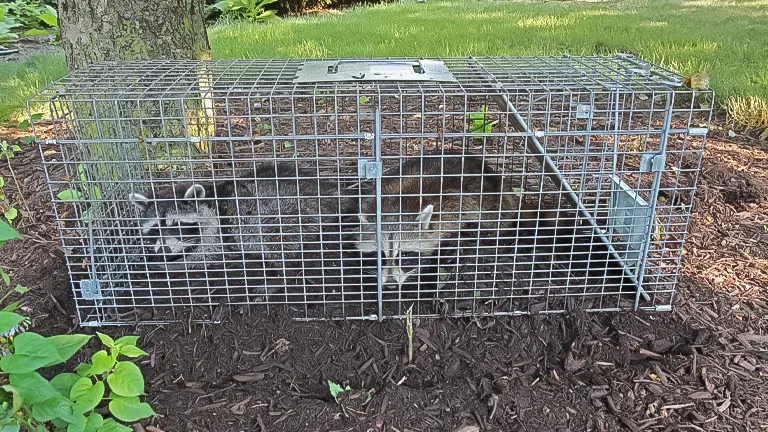
Protecting your flock requires a multifaceted approach, incorporating physical barriers, deterrents, and vigilant monitoring. This guide outlines effective strategies to safeguard your chicken coop from raccoon invasions, ensuring the safety and well-being of your poultry.
List of How to Keep Raccoons Away from Your Chicken Coop:
- Implementing Fortified Barriers
- Strategic Deterrents and Alarms
- Enhancing Coop Design for Maximum Security
- Continuous Monitoring and Adaptation
Basic Understanding About Guide to Deterring Raccoons from Your Chicken Coop
Deterring raccoons from your chicken coop involves a multifaceted approach, focusing on strengthening the coop’s defenses and employing strategies to keep these intelligent predators at bay. Raccoons, known for their dexterity and problem-solving abilities, pose a significant risk to poultry due to their capability to open latches, climb, and even dig.
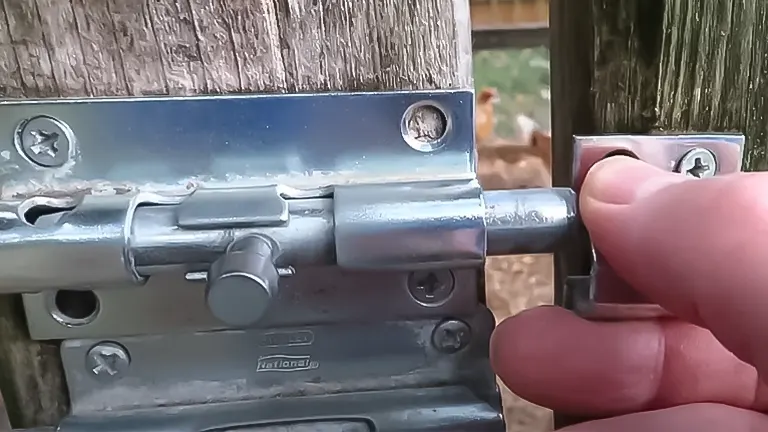
To protect your chickens, it’s crucial to reinforce the coop with hardware cloth instead of chicken wire, as hardware cloth is more robust and less susceptible to being torn or chewed through by raccoons.
Additionally, installing secure locking mechanisms that go beyond simple latches can prevent raccoons from accessing the coop. Electric fencing can serve as an effective deterrent, delivering a safe, corrective shock to raccoons that attempt to breach it.
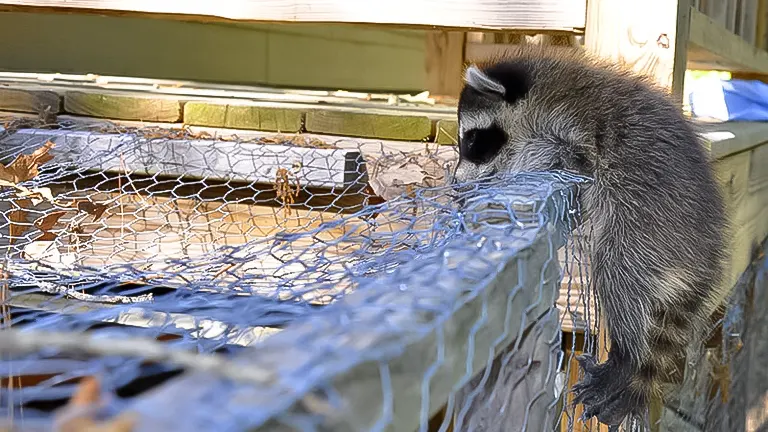
Beyond physical barriers, incorporating motion-activated lights or sounds, using predator deterrent lights that mimic the eyes of raccoon predators, or applying scent repellents around the perimeter of the coop can also discourage raccoons from approaching.
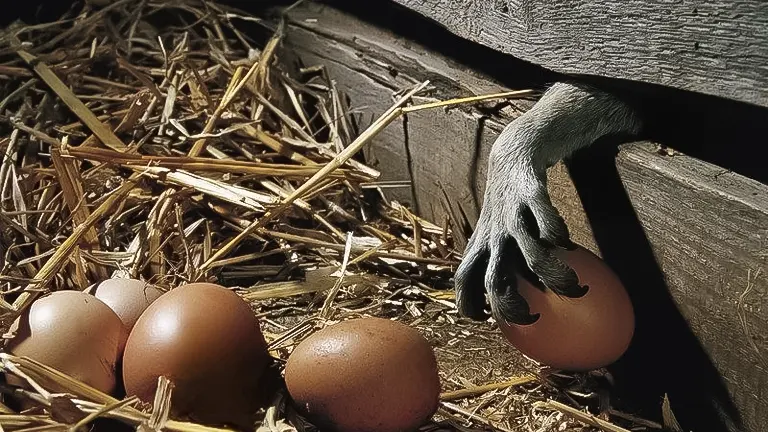
Continuous monitoring, regular inspections for vulnerabilities, and adapting strategies based on observed raccoon behavior are essential for maintaining a secure environment for your chickens. This integrated approach ensures a strong line of defense against raccoons, safeguarding the well-being of your poultry.
1. Implementing Fortified Barriers
The first line of defense against raccoons is to reinforce your chicken coop with materials that resist tampering and breaching.
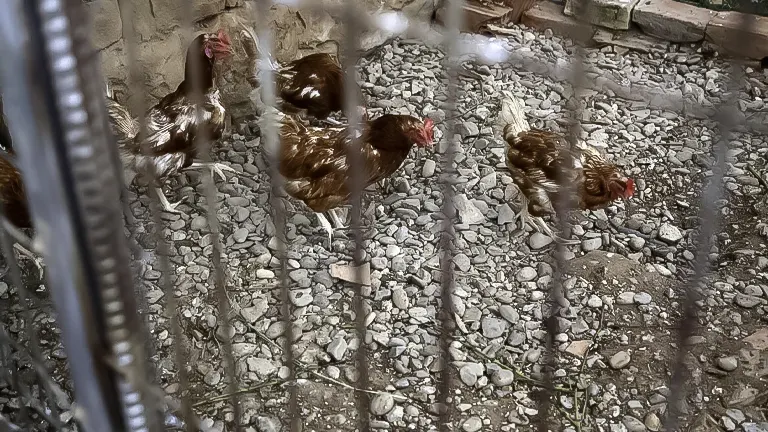
- Hardware Cloth Over Chicken Wire: Replace or reinforce chicken wire with hardware cloth, a stronger, more durable material that raccoons cannot easily tear or bite through. Ensure that the hardware cloth extends underground around the perimeter of the coop and run to prevent digging.
- Secure Locking Mechanisms: Raccoons are adept at opening simple latches. Upgrade to two-step or more complex locking mechanisms that are beyond their manipulative capabilities. Consider locks that require a key or a combination, adding an extra layer of security.
- Electric Fencing: An electrified perimeter fence serves as a powerful deterrent, delivering a non-lethal shock to any raccoon that attempts to breach it. Solar-powered electric fences are effective and environmentally friendly options for enclosing your coop and garden.
2. Strategic Deterrents and Alarms
Beyond physical barriers, integrating deterrents can further protect your coop from nocturnal predators.

- Motion-Activated Lights and Sounds: Install motion-activated floodlights or alarms around the coop. The sudden burst of light or noise can startle and scare away raccoons before they can do harm.
- Predator Eyes: Devices that mimic the glowing eyes of a raccoon’s predators can be effective. These solar-powered gadgets flash a red light at night, simulating the presence of a larger predator and discouraging raccoons from approaching.
- Scent Repellents: Raccoons are deterred by certain smells. Ammonia-soaked rags or commercially available predator urine can be placed around the coop to create an olfactory barrier that raccoons will avoid.
3. Enhancing Coop Design for Maximum Security
Designing your coop with security in mind can make it less appealing to raccoons and other predators.
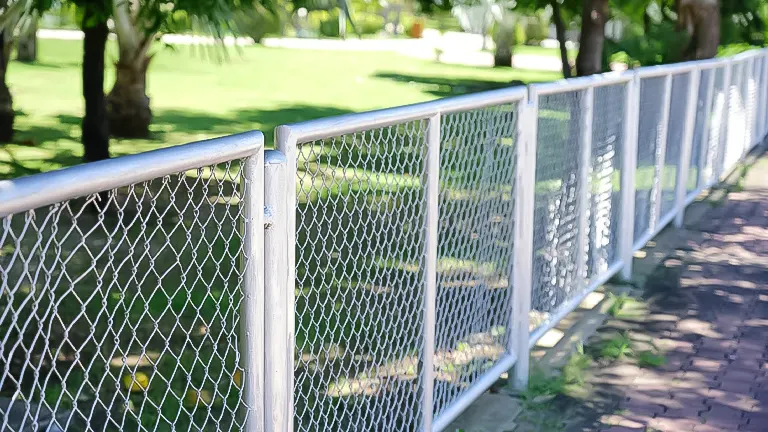
- Elevated Coops: An elevated coop can prevent raccoons from gaining access to your chickens. Ensure the elevation mechanism is raccoon-proof and that the coop is high enough to deter jumping.
- Solid Flooring: Solid, durable flooring prevents raccoons from digging their way into the coop. Concrete slabs or tightly fitted wooden floors offer the best protection.
- Window and Vent Covers: Windows and vents should be covered with hardware cloth to prevent raccoons from entering through these weaker points. Double layering and securing with strong fasteners can add an extra level of security.
4. Continuous Monitoring and Adaptation
The behavior and tactics of raccoons can evolve, necessitating ongoing vigilance and adaptation of your protective measures.
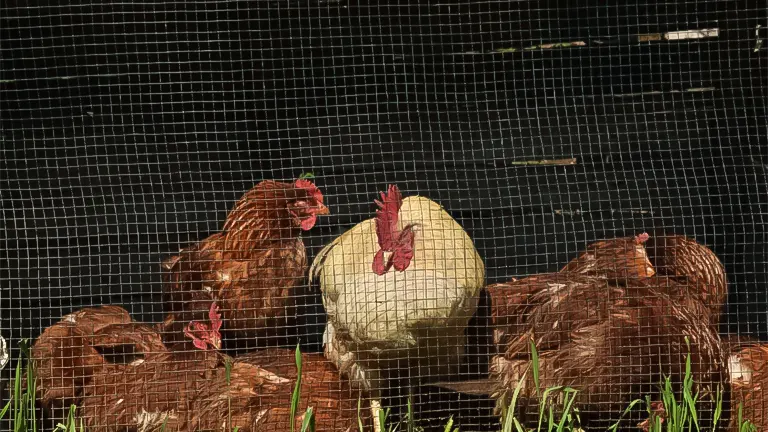
- Regular Inspections: Conduct frequent inspections of your coop and surrounding area for signs of attempted intrusion or weak points that could be exploited by raccoons.
- Trail Cameras: Install trail cameras to monitor wildlife activity around your coop. Identifying the presence and habits of raccoons can help you tailor your deterrent and protection strategies more effectively.
- Community Engagement: Share experiences and tips with other chicken keepers in your community. Learning from the successes and challenges of others can provide valuable insights into protecting your flock.
Additional Maintenance and Safety Tips
Maintaining a raccoon-proof chicken coop requires ongoing vigilance and a few key practices beyond the initial setup. Here are five additional maintenance and safety tips to help deter raccoons from your chicken coop effectively:
- Regularly Inspect and Repair the Coop: Conduct thorough inspections of your coop and surrounding enclosure regularly. Look for any signs of wear, tear, or potential entry points for raccoons, such as loose hardware cloth, gaps in the structure, or weakened latches. Promptly repair any damages to ensure the integrity of your coop’s defenses.
- Maintain Cleanliness Around the Coop: Raccoons are attracted to easily accessible food sources. Regularly clean the area around your coop, removing any spilled feed, leftovers, or accessible water sources that might attract raccoons and other predators. Consider using a treadle feeder that only opens when chickens step on it, minimizing attractants.
- Use Multiple Deterrent Methods: Relying on a single deterrent method might not always be effective, as raccoons can learn and adapt. Combine physical barriers with deterrents such as motion-activated lights or sprinklers, ultrasonic devices, and natural repellents to create a multi-layered defense system against raccoons.
- Securely Store Feed and Water: Store chicken feed in secure, airtight containers to avoid attracting raccoons with the scent of feed. Remove water sources at night and ensure that feeders and waterers are not accessible to raccoons, further reducing the allure of your coop as a food source.
- Implement a Nightly Lockdown Routine: Ensure that all chickens are securely locked inside the coop each night and that all doors, windows, and vents are properly secured. Raccoons are primarily nocturnal, so a nightly routine to check and secure your coop can significantly reduce the chances of a raccoon attack.
Related Articles:
- Best Bedding For Chickens
- Best Safe Chicken Coop Heater
- 8×8 Chicken Coop Plans
- Turning a Shed Into a Chicken Coop
- How to Make a Chicken Coop Out of Pallets
- Best Sand for Chicken Coop
- How To Insulate a Chicken Coop
- How To Heat a Chicken Coop
- How To Keep Water from Freezing in Chicken Coop
- How to Build a Chicken Coop
- How To Build Chicken Nesting Boxes
- How to Raise Happy and Healthy Chickens in Your Backyard
- When Can Chicks Go Outside? Timing and Tips for a Smooth Transition
- 12 Reasons why Ducks are Better than Chickens
- Best Automatic Chicken Coop Doors 2024: Expert Reviews & Buyer’s Guide
- Best Fans for Chicken Coop 2024: Effective Cooling Solutions Reviewed
Final Conclusion
Protecting your chickens from raccoon attacks requires a comprehensive, proactive approach. By combining strong physical defenses with clever deterrents and continuous monitoring, you can create a safe environment for your poultry. Remember, the goal is not just to react to raccoon intrusions but to prevent them from considering your coop a target in the first place. With dedication and vigilance, you can ensure the safety of your chickens against these intelligent, adaptable predators.
Frequently Asked Questions
- What attracts raccoons to chicken coops?
Raccoons are attracted to chicken coops primarily by the availability of food (chickens and their feed), water, and shelter. Ensuring food is secured and minimizing water sources near the coop can reduce attractiveness. - Can raccoons break into chicken coops easily?
Yes, raccoons are highly intelligent and have nimble hands capable of opening latches, untying knots, and tearing through materials like chicken wire. Upgrading to secure locks and using hardware cloth can help prevent break-ins. - What is the best material to use for securing coops from raccoons?
Hardware cloth is recommended over chicken wire. It’s made of a stronger gauge wire and has smaller openings that raccoons cannot manipulate or tear open. - How can I make my coop latch raccoon-proof?
Use a two-step or complex locking mechanism that requires human intelligence to open. Simple latches can easily be figured out by raccoons. Consider padlocks or locks that require keys. - Is electric fencing effective against raccoons?
Yes, electric fencing can be a very effective deterrent for raccoons. It provides a physical barrier that also delivers a shock to potential predators, deterring them from trying to enter your coop. - Do ultrasonic repellents work to deter raccoons? Ultrasonic repellents have mixed reviews. Some users report success, while others see no effect. These devices are worth trying but should not be relied upon as the sole deterrent method.
- How can I protect my chickens from raccoons at night?
Ensure your chickens are securely locked inside the coop at night with all potential entry points covered by hardware cloth and secured with raccoon-proof latches. - What natural deterrents can I use against raccoons?
Natural deterrents like ammonia-soaked rags or predator urine can create an unwelcoming environment for raccoons without harming them. - Can installing lights around the coop deter raccoons?
Motion-activated lights can deter raccoons by startling them. These are most effective when the light is not constant but triggered by movement. - Should I use a trap for raccoons, and is it legal?
Before trapping raccoons, check your local wildlife laws, as regulations vary by location. If legal and you choose to use traps, ensure they are humane and check them frequently. It’s often better to focus on prevention and deterrence methods to avoid harming wildlife unnecessarily.
For expert insights on safeguarding your chicken coop against raccoons, immerse yourself in our extensive collection of guides, learn from our curated best practices, and dive into detailed product reviews within our review section. Find proven strategies and the latest recommendations to keep raccoons at bay and protect your poultry with assurance. Equip yourself with the knowledge to maintain a secure environment for your chickens, ensuring their safety and your peace of mind.

Edward Smith
Forestry AuthorWoodworking is about more than crafting; it's a harmonious connection with nature, mastering tools, and preserving our environment. I'm here to share my knowledge and experiences with you, forging a future where we can embrace wood's beauty and utility while safeguarding our forests' health and diversity.













Leave your comment